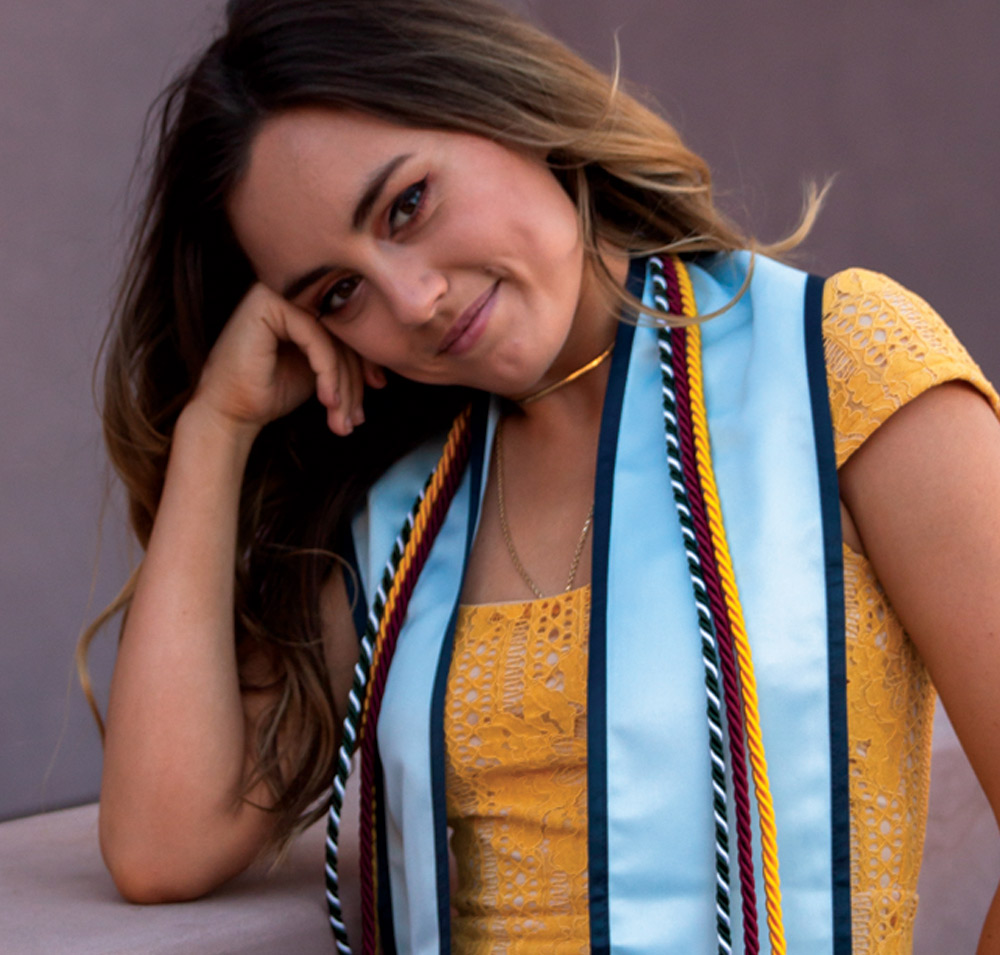hen Alexis Gulbransen (BS Marketing ’18) received the Brian Etheridge Scholarship in her senior year at ASU, it was a life-changing day. Although she didn’t know it at the time, the gift would turn out to be about much more than money to pay for her final year at the W. P. Carey School of Business; the real gift would be the connection she made with the scholarship’s founder, who started the fund just six months after he graduated from ASU.
For Brian Etheridge (BS Economics ’96), that day in 2018 was just one of many days when he changed lives.
Over the past 20 years, Etheridge’s scholarship recipients have gone on to do great things: Sam Haghgoo (BS Management/Marketing ’14) helped develop the Apple Pay program, Keith Ryu (BS Computer Information Systems/Finance ’14) landed on Forbes’ 30 Under 30 list after starting a Silicon Valley company, Ashley Rosselli (BS Management ’15) recorded an album, and Victoria Crynes (BA Global Politics ’18) studied at Cambridge University.

And that’s not just because they received a few thousand dollars to help with tuition. It’s because Etheridge played a key role in mentoring them during college and beyond.
Mentoring and making connections
Etheridge didn’t only hand out money and run — he stayed involved in the winners’ lives, providing advice and guidance. “He genuinely cares about where his recipients go in life,” Gulbransen says. “He wants to do good and mentor people. That’s what makes this scholarship so different, and I appreciate that.”
Etheridge, who is director of general and administrative business architecture at Freeport-McMoRan, also has a successful real estate business and sits on several boards in the Phoenix area. He’s built an impressive professional network and he shares that clout with his scholarship recipients, making key introductions and connections.
That was invaluable for Gulbransen when she started looking for a job her senior year. “It was great because he was able to connect me with people in different fields related to marketing,” she says. “That helped me explore what I wanted to do. He was always there to bounce ideas off or to ask questions when I was grappling with transitioning from one phase of life to another.”
Finding students with potential
The Brian Etheridge Scholarship has three main criteria: academics, working, and volunteering. Its founder says people who focus solely on getting good grades often get so singularly focused, they get stuck: “If you can’t apply knowledge, then it’s not useful. It’s like a Ferrari sitting in a garage in a community that only allows you to drive 25 miles an hour.”
Based on these criteria, Gulbransen was an ideal candidate. During her time at ASU, she worked at Barrett, The Honors College in its global and study abroad department creating promotions and advertising. She also volunteered on the executive Panhellenic council doing event marketing and merchandising. Day to day, she was learning to manage her time and applying the concepts she was learning in her marketing classes.
Etheridge is thankful for the value of the education he received at ASU and the price tag it came with.
“If you can graduate without crippling student debt, you can take more risks without a big debt looming over your head.” He says if you graduate needing to pay back “you’re working for your education for several years before your education starts working for you.”
Etheridge’s recipients also have expressed gratitude for that freedom. Many didn’t qualify for financial need, so the scholarship money they received made a real difference.
Now they’re trying to make a difference, too. Gulbransen works as an influencer relationship coordinator at marketing agency August United in Tempe. The industry is fairly new, so she’s made herself available to answer questions from ASU students interested in a similar career path. “I love paying forward the mentorship I received from Brian,” she says. She’s also carrying on Etheridge’s philanthropic tradition, starting with donations to ASU’s scholarship fund.
(BS Economics ’96)
In 2018, Etheridge felt that the gap he’d identified was being filled in other ways, so he reached out to W. P. Carey to see where he could help. His donations now go toward helping the economics department recruit women professors. “Women are drastically underrepresented in economics so they tend to be highly sought after by a variety of universities. I wanted ASU to be competitive.”
What would Etheridge tell other alumni about starting a scholarship? “Start early, and have a clear vision for what you want to reward, as well as what you want to get out of it.”
Etheridge also reminds alumni of the value of ASU’s online communities. “Part of what I was trying to do with this scholarship was to build a community of people who could draw on each other. Being part of the Sun Devil community is a way to facilitate something like that and to be a part of something that is growing and becoming more and more valuable.”